SOLID WASTE ANALYSIS
AND MINIMIZATION
A SYSTEMS APPROACH
MATTHEW J. FRANCHETTI, Ph.D., P.E.


Copyright 2009 by The McGraw-Hill Companies, Inc. All rights reserved. Except as permitted under the United States Copyright Act of 1976, no part of this publication may be reproduced or distributed in any form or by any means, or stored in a database or retrieval system, without the prior written permission of the publisher.
ISBN: 978-0-07-160525-0
MHID: 0-07-160525-8
The material in this eBook also appears in the print version of this title: ISBN: 978-0-07-160524-3, MHID: 0-07-160524-X.
All trademarks are trademarks of their respective owners. Rather than put a trademark symbol after every occurrence of a trademarked name, we use names in an editorial fashion only, and to the benefit of the trademark owner, with no intention of infringement of the trademark. Where such designations appear in this book, they have been printed with initial caps.
McGraw-Hill eBooks are available at special quantity discounts to use as premiums and sales promotions, or for use in corporate training programs. To contact a representative please e-mail us at bulksales@mcgraw-hill.com.
Information contained in this work has been obtained by The McGraw-Hill Companies, Inc. (McGraw-Hill) from sources believed to be reliable. However, neither McGraw-Hill nor its authors guarantee the accuracy or completeness of any information published herein, and neither McGraw-Hill nor its authors shall be responsible for any errors, omissions, or damages arising out of use of this information. This work is published with the understanding that McGraw-Hill and its authors are supplying information but are not attempting to render engineering or other professional services. If such services are required, the assistance of an appropriate professional should be sought.
TERMS OF USE
This is a copyrighted work and The McGraw-Hill Companies, Inc. (McGraw-Hill) and its licensors reserve all rights in and to the work. Use of this work is subject to these terms. Except as permitted under the Copyright Act of 1976 and the right to store and retrieve one copy of the work, you may not decompile, disassemble, reverse engineer, reproduce, modify, create derivative works based upon, transmit, distribute, disseminate, sell, publish or sublicense the work or any part of it without McGraw-Hills prior consent. You may use the work for your own noncommercial and personal use; any other use of the work is strictly prohibited. Your right to use the work may be terminated if you fail to comply with these terms.
THE WORK IS PROVIDED AS IS. McGRAW-HILL AND ITS LICENSORS MAKE NO GUARANTEES OR WARRANTIES AS TO THE ACCURACY, ADEQUACY OR COMPLETENESS OF OR RESULTS TO BE OBTAINED FROM USING THE WORK, INCLUDING ANY INFORMATION THAT CAN BE ACCESSED THROUGH THE WORK VIA HYPERLINK OR OTHERWISE, AND EXPRESSLY DISCLAIM ANY WARRANTY, EXPRESS OR IMPLIED, INCLUDING BUT NOT LIMITED TO IMPLIED WARRANTIES OF MERCHANTABILITY OR FITNESS FOR A PARTICULAR PURPOSE. McGraw-Hill and its licensors do not warrant or guarantee that the functions contained in the work will meet your requirements or that its operation will be uninterrupted or error free. Neither McGraw-Hill nor its licensors shall be liable to you or anyone else for any inaccuracy, error or omission, regardless of cause, in the work or for any damages resulting therefrom. McGraw-Hill has no responsibility for the content of any information accessed through the work. Under no circumstances shall McGraw-Hill and/or its licensors be liable for any indirect, incidental, special, punitive, consequential or similar damages that result from the use of or inability to use the work, even if any of them has been advised of the possibility of such damages. This limitation of liability shall apply to any claim or cause whatsoever whether such claim or cause arises in contract, tort or otherwise.
Dedication
This book is dedicated to my children Jack and Kate so that the world may be a cleaner and healthier place for them and their children.
About the Author
Matthew J. Franchetti, Ph.D., P.E., is an Assistant Professor of Mechanical, Industrial, and Manufacturing Engineering and Director of Undergraduate Studies for the Mechanical and Industrial Engineering Programs at The University of Toledo.
CONTENTS
PREFACE
Green initiatives have increased in popularity in recent years as many organizations attempt to analyze and reduce environmental impacts. This gain in attention has been brought on by consumer demand for cleaner production, dwindling natural resources, and population growth around the world. Solid waste minimization and management is often an overlooked component of an overall environmental protection plan for organizations. The focusing on sustainability, waste reduction, and green initiatives by individual firms can lead to enhanced economic performance, environmental protection, and health benefits for the worldwide community.
Solid Waste Analysis and Minimization: A Systems Approach provides an up-to-date source of technical information relating to current and potential solid waste minimization practices. This book gives a detailed framework and reference material and is broken into four parts:
 gives definitions, benefits, and background information regarding solid waste analysis and minimization.
gives definitions, benefits, and background information regarding solid waste analysis and minimization.
 discusses solid waste assessment strategies and provides the general framework for conducting a solid waste audit.
discusses solid waste assessment strategies and provides the general framework for conducting a solid waste audit.
 discusses solid waste modeling, prediction, and evaluation for various industries based on standard industry classifications.
discusses solid waste modeling, prediction, and evaluation for various industries based on standard industry classifications.
 features 21 case studies in various industries, including two illustrating international businesses.
features 21 case studies in various industries, including two illustrating international businesses.
This book serves as both a practical and a technical guide to minimizing solid waste for any organization, from manufacturing to service facilities. It is based on the solid waste minimization hierarchy of reduce, reuse, and recycle. The solid waste auditing procedure detailed in this book has been applied and refined over the past 12 years on more than 80 solid waste assessment projects around the globe. I am confident that this book will contribute to the field of solid waste management and emphasize the need for continued research as we strive for sustainable solutions to solid waste issues.
Acknowledgments
I wish to acknowledge the Lucas County Solid Waste Management District and the Lucas County Board of Commissioners for their continued support and commitment to prevention of pollution and sustainability. Their funding of solid waste reduction research since 1996 has led to many of the examples and case studies discussed in this book. Specifically, I would like to mention Mr. James Walters of the Lucas County Solid Waste Management District and Dr. Robert Bennett of The University of Toledo for their guidance and support related to solid waste minimization. I also wish to thank the numerous undergraduate and graduate students who have conducted research in the Environmentally Conscious Design and Manufacturing Laboratory at The University of Toledo.


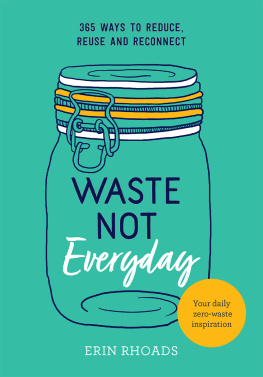
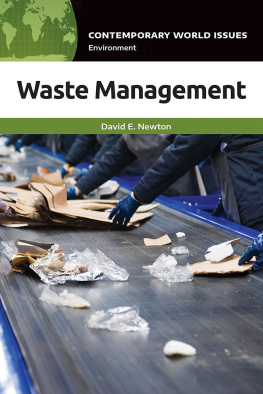
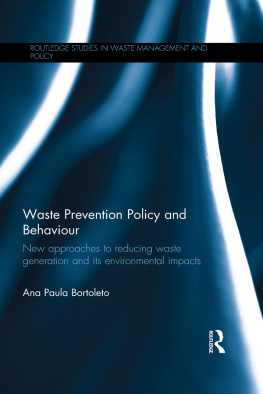
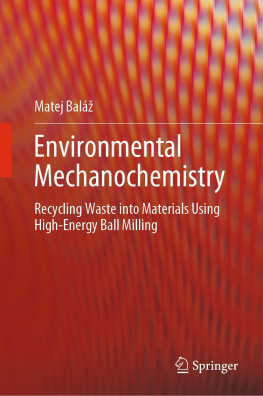
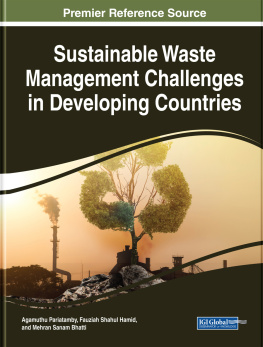
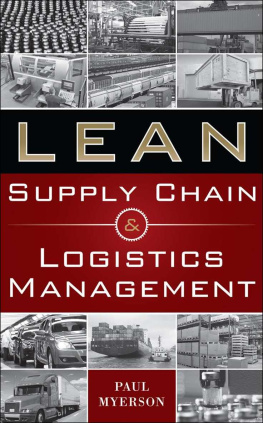


 gives definitions, benefits, and background information regarding solid waste analysis and minimization.
gives definitions, benefits, and background information regarding solid waste analysis and minimization.